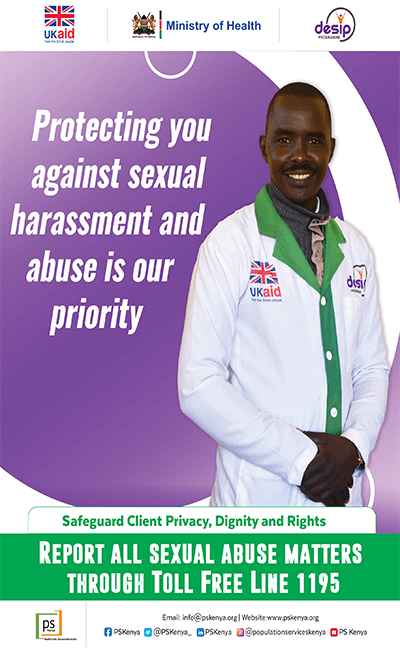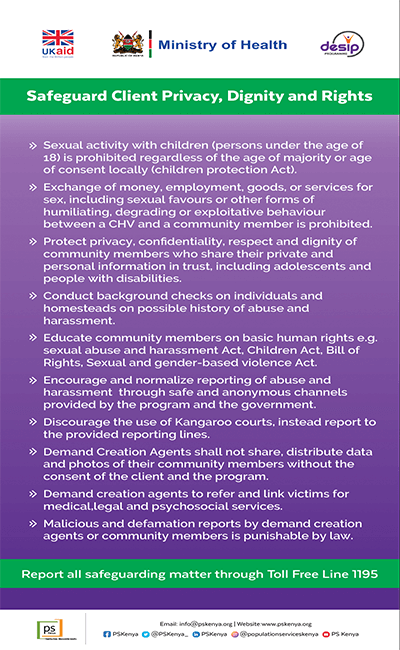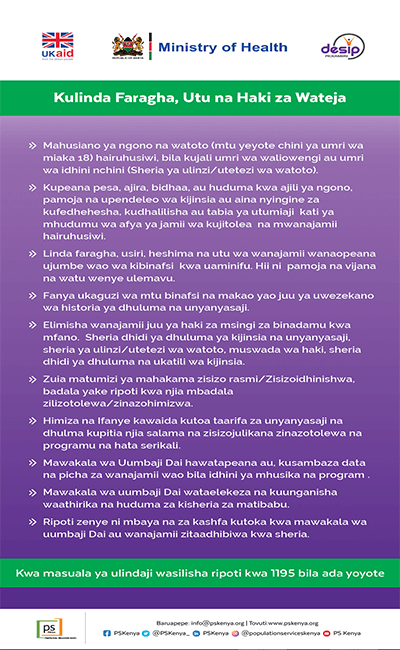DESIP Safeguarding Strategy
The DESIP Programme, led by PS Kenya in partnership with other consortium members, implemented a comprehensive safeguarding strategy to protect all stakeholders across 17 implementation counties in Kenya. The strategy was designed with a strong focus on preventing Sexual Exploitation, Abuse, and Harassment (SEAH), ensuring the dignity, rights, and safety of beneficiaries, staff, and community partners.
In alignment with the UK Safeguarding Strategy, DESIP’s safeguarding framework addressed power dynamics shaped by gender, age, and socioeconomic factors. The strategy is based on six core principles:
The Six core Principles of DESIP Safeguarding Strategy
Key actions under this strategy included continuous staff training, awareness campaigns, and the establishment of confidential reporting mechanisms. These efforts ensured that all participants understood their rights and knew how to report any concerns.
Through PS Kenya, the DESIP Programme maintained a strict zero-tolerance policy against SEAH, which prohibited sexual relationships between staff and beneficiaries, sexual activity with minors, and exploitative behaviors such as exchanging services for sexual favors. Confidentiality remained a cornerstone of the program, with stringent policies to safeguard sensitive client information and prevent unauthorized disclosures.
Training and Capacity Building
To embed safeguarding within the program, DESIP conducted continuous training sessions for staff, healthcare providers, and community stakeholders. These sessions focused on identifying safeguarding risks, handling incidents confidentially, and supporting victims effectively. By integrating safeguarding into daily activities, the program ensured that all stakeholders were equipped to uphold safeguarding principles.
Monitoring and Reporting Mechanisms
The safeguarding strategy extended deeply into local communities. Demand creation agents educated vulnerable groups, including persons with disabilities and adolescents, about their rights and how to report concerns. Safeguarding messages were communicated through training, posters, and counseling materials, ensuring that these principles were embedded in the program’s activities.
Collaborative Approach
DESIP worked closely with county governments to enforce safeguarding policies and standards. This collaboration not only created safer environments for family planning services but also built lasting trust and confidence within the community. The success of these efforts underscored the significant impact of a consistent, inclusive approach to safeguarding.
Safeguarding Resources and Tools
The program provided essential safeguarding resources, including policies, reporting forms, and training materials, to staff and stakeholders. These tools helped integrate safeguarding into everyday practice and ensured transparency and accountability throughout the program.
Evaluation and Lessons Learned
DESIP employed the Safeguarding Self-Assessment Tool and a safeguarding risk compliance plan to proactively identify, mitigate, and monitor safeguarding risks. PS Kenya staff conducted quarterly safeguarding risk reviews, while internal audits were carried out to assess the effectiveness of safeguarding measures. By monitoring risk trends and adapting to emerging challenges, the program maintained high standards of safeguarding and continuously improved its practices.
This proactive approach not only protected stakeholders but also strengthened organizational accountability and trust.
DESIP’s safeguarding practices have laid a solid foundation for future programming. The collaboration with county governments, along with continuous community engagement, has helped establish a legacy of trust, safety, and accountability, ensuring the protection of vulnerable populations and fostering a culture of respect and dignity across all program activities.





